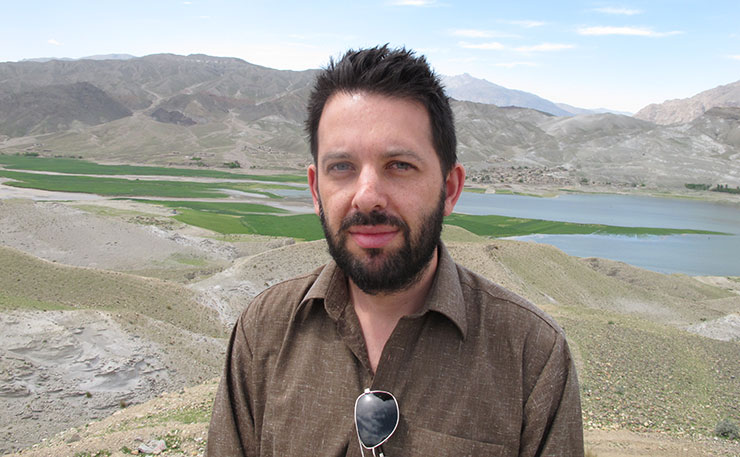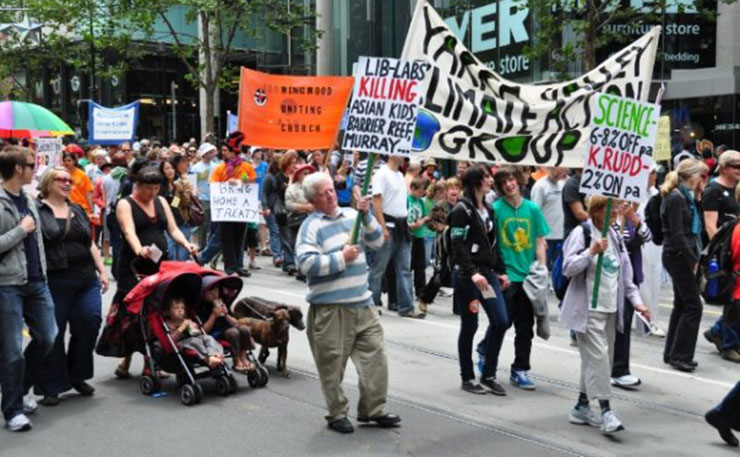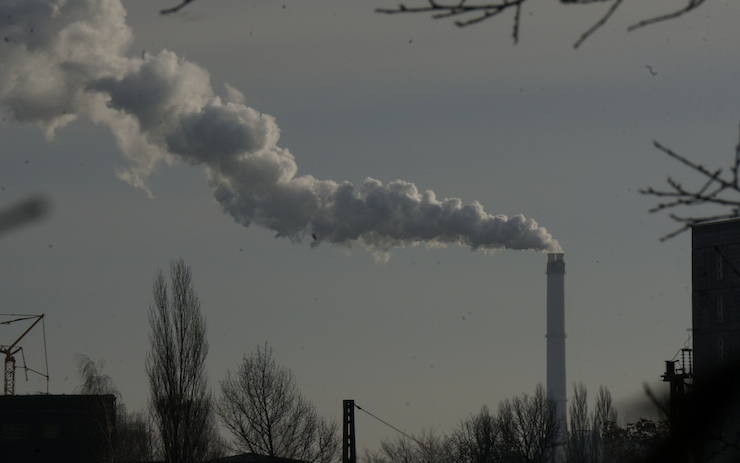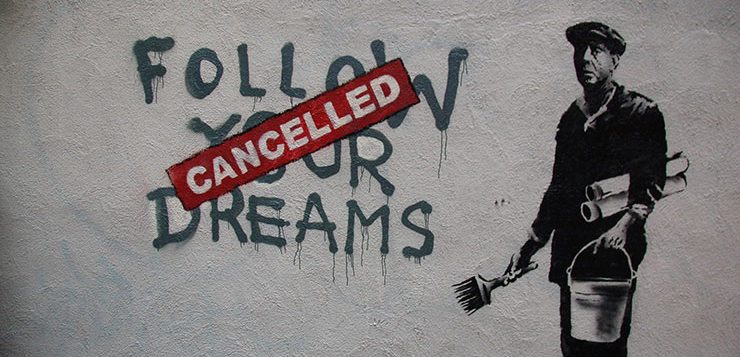DON’T MISS ANYTHING! ONE CLICK TO GET NEW MATILDA DELIVERED DIRECT TO YOUR INBOX, FREE!
Speaking out against injustice – whether it’s a lack of action on climate change, or slaughter in the Middle East – comes at a price, writes Richard Hil.
Should I focus on one person like this? That was the thought that dogged me before hitting the send button. It might cause embarrassment or detract from a focus on the issues. But then I thought of Greta Thunberg, the remarkable Swedish climate activist. She’s in a no-win situation.
Remain silent, do nothing and become terminally depressed. That’s not too appealing. Speak out, become a leader, take on the establishment and suddenly you’re condemned for being egotistical, naive, sick, or in the pay of nefarious characters.
She’s even been called divisive, to which Naomi Klein responded by noting that the climate emergency and ecological crises have been made divisive because of denial, inaction and politicisation.
BE PART OF THE SOLUTION: WE NEED YOUR HELP TO KEEP NEW MATILDA ALIVE. Click here to chip in through Paypal, or you can click here to access our GoFundMe campaign.
Individuals who find themselves in the public glare inevitably become the targets of personal attacks – just ask Noam Chomsky, Chris Hedges, Arundhati Roy, Alexandria Ocasio-Cortez, Stuart Rees, Antony Loewenstein, Adam Goodes, etc. The personal toll can be devastating, although people like Greta are driven by moral concerns rather than celebrity status. She has said as much, bemoaning the fact that she feels there is no choice but to act. She’d much rather be back in school.

I’m sure that there are other things that Gideon Polya might choose to do too, if he wasn’t so often affronted by the world before him. Now a retired associate professor of biochemistry, Polya has spent much of his life trying to calculate the number of avoidable deaths around the world. It’s not the cheeriest project in the world, but it’s something he feels compelled to do.
And it’s tough going, not least because of the official obfuscation, distortion and wilful ignorance of the available data. But if we consider avoidable deaths as those fatalities that could have been prevented had relevant human and other basic services been available then the figures are truly astounding – horrifyingly so.
In most cases, as Polya notes, these are deaths that could have been prevented by “fairly modest levels of government expenditure on sustenance, health and education”. For many poorer countries, such expenditure is not readily available. Nonetheless, Polya argues that, “Avoidable deaths from deprivation in a country can be estimated as the difference between the actual deaths in a country and the deaths observed in a peaceful, decently governed country with the same demographics (i.e. birth rate and age distribution).”
This assumes a lot, of course, but the key point remains, particularly when we consider the grotesque ways in which resources are distributed around the world.
Avoidable deaths are no accident of course. The origins reside in predatory economic relations structured over millennia. Few if any countries have escaped the consequences. It’s telling that in the US today – the richest nation on earth – mortality rates are now rising among poorer groups; people are dying at a younger age from conditions associated with deep poverty.
In Australia, Indigenous people die, on average, 10 years earlier than non-Indigenous Australians, this in a wealthy society (although not forgetting the three million or so who live in poverty).
The reality of preventable deaths is not a topic the powerful want us to talk about, and that’s why Polya has, over the years, been such a thorn in the side of the complacency.
His analyses tend to rupture cosy assumptions of the good life and expose the cruel and deceitful actions of the powerful. He’s been accused, by his detractors, of antisemitism for drawing attention to preventable deaths among Palestinians, and shunned for exposing the harms inflicted upon citizens by their own governments through iniquitous or deliberately cruel policies.

Polya has also highlighted the brutal consequences of empire-rule, noting for instance how the actions of the British government under Winston Churchill during the 1940s led to the deaths of millions of Bengalis. He’s also written extensively about what eventuated when the US and its allies invaded Iraq in 2003, or when Middle Eastern states have been bombed into oblivion.
The way Polya expresses himself is sometimes regarded as intemperate, even extreme. He does employ rather colourful language for the perpetrators of violence. But that’s because he’s enraged by what he continually uncovers and the tendency of those in power to turn a blind eye to pain and suffering.
Most of us rage in private; Polya rages in public. I can’t fault him for that. I mean, injustice and cruelty do infuriate. We can, sometimes, be too reasonable. Getting peeved in public though, comes with a price.
In earlier times, Polya was given airtime on ABC Radio and was occasionally reported by other media outlets. That’s no longer the case. He describes himself as “invisible”. His attacks on media misreporting and ignorance have rendered him persona non grata. But that hasn’t stopped him. Far from it. Polya posts regularly on Facebook and his articles can be found in the US online magazine, Countercurrents.
When it comes to the question of climate change, he doesn’t hold back either. He accuses western governments and fossil fuel companies of being directly responsible for the premature deaths of millions of people around the world. He talks of an emergent “climate genocide” brought about by “climate criminals” who either deny the climate science or, like fossil fuel giant, Exon Mobil, choose to ignore it in favour of profit maximisation.
According to Polya, organised violence can come in many different forms. He makes the useful distinction between violence through omission and commission. So, when the ABC constantly censors itself by avoiding any reference to climate change in its reports on “extreme weather events” – mainly because “climate change” has become so politicised – then it effectively endorses the status quo, that is, obfuscation.
BE PART OF THE SOLUTION: WE NEED YOUR HELP TO KEEP NEW MATILDA ALIVE. Click here to chip in through Paypal, or you can click here to access our GoFundMe campaign.
Similarly, when news organisations fail to report how banks, fossil fuel companies and tainted politicians flout climate action, this is also a form of violence, as real in its lived effects as being assailed with a blunt instrument (just ask South Sea Islanders).
Acts of omission also occur when news outlets ignore the experiences of the marginalised and oppressed, or when they skate over atrocities, the slow violence of poverty, and abuses of human rights. Those impacted by such things become what John Pilger refers to as “unpeople”, non-existent in public discourse and ominously absent in the consciences of perpetrators.
But then there’s violence by commission when, for instance, government policies produce harmful effects such as, in the case of Australia, the treatment of refugees, Indigenous people, and those on a Newstart allowance. It’s the effects of power that matter in such cases, and the very real harm that results.
In commenting on a recent IMF report about Australia’s record on greenhouse gas mitigation, particularly its ongoing refusal to endorse a price on carbon, Polya observes the following: “The IMF’s assertion of ‘725,000 fewer premature deaths in 2030 for a $75 a ton tax for G20 countries alone’ means (assuming that such a Carbon Tax could be rapidly implemented by all the G20 countries) that lives saved in the period 2020-2030 would average 725,000/2 = 362,500 lives saved per year, and thus would total 362,500 lives per year x 11 years = 4.0 million lives saved (2020-2030).”
Now you might quibble with these calculations – indeed, the way things are going, Polya’s calculus is likely to scale-up very rapidly. Four million lives by 2030? That could be a serious underestimate. After all, many scientists are now predicting disastrous climate impacts within a decade. Others maintain that we’re already in the midst of an extinction process, with feedback loops, multiplier effects and compounding shocks likely to accelerate an already exponential trend.
Australia’s contribution to this scenario, along with its blatant refusal, as noted recently by the Climate Council, to take radical action on climate change, is now widely known. The Morrison government shamelessly uses less-than-clever accounting tricks to fudge its record on meaningful climate action. Indeed, Australia’s carbon emissions have risen steadily since the Abbott government got rid of the so-called “carbon tax” in 2014.

Meanwhile, Australia lauds its wealth, much of it generated by an obscene trade in coal and gas exports. “Each year”, says Polya (who draws on WHO data), “8 million people die from air pollution, this includes about 10,000 Australians and 75,000 dying from the effects of pollutants from the burning of Australia’s world leading coal exports”. But that’s only part of this nation’s shameful record.
The fact is, we like to punch above our weight when it comes to inflicting death and destruction on our own and other people. As Polya notes, Australia is among the world’s worst when it comes to annual per capita greenhouse gas pollution, methanogenic livestock exports, natural gas exports, fracking, coal exports, land clearing, deforestation, species extinction, coral reef bleaching, destruction of sea life, carbon pollution from iron ore exports, and – of course – climate inaction.
It’s a long and shameful record – one that the powerful certainly do not want us to make too public. Australia’s “predatory delay”, as Ian Dunlop and David Spratt describe current energy policy (designed to prolong the life of coal) is, they say, “totally untenable in geopolitical terms, nothing less than a crime against humanity”.
It’s criminal behaviour of the most egregious kind, guaranteeing wealth for a small number of Australians at the expense of some of the poorest nations.
Such egregious behaviour is precisely why we need the Gideon Polyas of this world, especially in an age of greed and moral vacuity. We need outspoken scientists, young people like Greta Thunberg and millions of schoolkids, university students, climate activists like Extinction Rebellion, academics, artists, poets, business people and everyone else to contribute to global civil uprising if there’s to be any chance of survival.
Yet, as Polya knows only too well, and as Thunberg is finding out, there’s a price to pay for such outspokenness and it comes in the hatred, vitriol and character assassinations that are hurled at good people like them. It’s the cost of seeking justice in a world of avarice and cruelty.
Polya and people like him, deserve our respect.
BE PART OF THE SOLUTION: WE NEED YOUR HELP TO KEEP NEW MATILDA ALIVE. Click here to chip in through Paypal, or you can click here to access our GoFundMe campaign.
Donate To New Matilda
New Matilda is a small, independent media outlet. We survive through reader contributions, and never losing a lawsuit. If you got something from this article, giving something back helps us to continue speaking truth to power. Every little bit counts.




